Production Sustainability Boost From Pandemic
Collaboration, Innovation, and Communication Key to Lasting Change, Says Expert Panel
We’re witnessing a culture change from the bottom up, observed Hemini Mehta, sustainability lead at the European Broadcaster Union. “The more you go through green productions, the more you realize that this is going to be the start of the way of working. That it’ll become part of your job, and there will be certain things that you’ll have to do, certain changes you’ll have to make.”
Despite the increased challenges and added costs of producing during a pandemic, a panel of experts PSN was honored to join for the recent KFTV Sustainability Talk concurs that Covid-19 has demonstrated what we’re capable of achieving together.
“Budgets are really stretched, it’s a really delicate balancing act,” noted ITV Studios head of production sustainability, Philip Holdgate. “That’s where innovation, knowledge sharing, collaboration really comes to the fore.”
From her work as sustainability manager on the sets Universal Pictures’ Jurassic World: Dominion and MGM/Eon’s No Time To Die, Louise Marie Smith has witnessed how the pandemic pause refocused everyone. “A lot of people seem to finally have had the time to rethink and really prioritize sustainability, and that’s across a lot of different departments on crews I’ve worked with. When they’ve had time to get together, you know, you’ve had makeup artists chat on zoom and put out huge sustainability guides as to what products that they would purchase because they finally had time to call all the companies that they provide to and go down that supply chain and gather all that information together that I think was there but that the time wasn’t.”
For its part, Production Service Network recently pledged to Green the Bid and is engaging with other industry initiatives to identify the sustainable production measures its Partners in 50 countries can adopt when executing commercial and long form productions in more than 100 countries. But not all territories are equally capable of achieving sustainability on set. The Network is counting on a constructive dialogue with decision makers that sets out their expectations and sees them choose to work with the production service partners worldwide that are best positioned to deliver all that is possible locally.
“If you don’t have that buy in from your top management, your execs, and financiers then it’s not going to work,” concludes Film producer Melanie Dicks, founder of Greenshoot and the Green Screen programme.
Smith remarked there’s no ignoring how climate impacts our industry. “One production I’m dealing with now has had to totally rejig their budget because they can’t go and shoot where they need to because there’s no ice, and they need the ice. It should be there this time of year, and it’s not. There’s another one I know a colleague of mine is working on in another country where they’ve had all their power cut from floods and landslides. The production team can’t even get back to the city. So, it’s already starting to happen that some productions are either having to shift schedule, change what they’re going to do and where they’re going to go, or they’re actually being prevented from filming altogether by climate-related disasters.”
Covid was the disaster that struck industrywide. But there are upsides sprouting like green shoots taking back a crumbling cityscape.
A number of commercial productions have seen brands and agencies connect remotely to the set – a demonstration that much can be done with fewer stakeholders racking up carbon emissions when flying in for a few days’ shoot. Consider films serviced locally by PSN Partners for Domino’s in Australia, Adidas in Austria, Corona in Brazil and Colombia, Shipt in Canada, Canada Goose in China, Audi in Denmark, Tiger Crisps in Egypt, Nike in France, BT Sports in Greece, HP in Iceland, Albert Heijn in Italy, Stella Artois in Mexico, Asics in Poland, Doordash in Romania, PIK in Russia, Asics in Serbia, Coca-Cola in South Africa, Instagram in South Korea, Mastercard-American Airlines in Spain, Unilever in Turkey, Expo 2020 in UAE, Vodafone in UK, Porsche in USA, and Mead Johnson in Vietnam.
Holdgate cited ITV’s remote connectivity with the team at PSN Spain as also facilitating the production of premiere long form projects. “Love Island is filmed on a Spanish island so historically we’ve taken the whole crew, flown them over there. We’ve done this great big entertainment shoot with loads and loads of power, loads of camera, kit, etc. But due to Covid restrictions what we were forced to do is carry out a lot of the production remotely from the UK, and we repeated that again this year as well. We’re still working through what that looks like in terms of carbon reduction. But you know, even if there’s a lot of energy going into setting that up in the UK, lot of taxis, hotels, things like that just to make it work to keep the show on the road, the emission savings from the reduction in flights are going to be significant. So how do we hang on to some of this really good stuff that’s come off the back of a pretty horrific situation?”
Measures involving everyone on set ensure continued raised awareness, suggested Smith. “On Jurassic we completely eliminated beef from our menu and we shot in 4 countries. That’s huge when you think of the size of the crew on a big picture like that. Absolutely thanks to our crew, and our Executive Producer, and our caterers for working that out. It was actually a simple swap. So that’s something I always approach. Not every producer is going to go for it. Not every catering team is going to go for it. But it is certainly a question worth asking. That’s something the whole crew can be involved in. It doesn’t necessarily have to be seen as something that’s being taken away from you. It’s really kind of an opportunity to do your part.”
Dicks employs regular comms to motivate film teams. “We issue a green memo at the start in prep, in development, in shooting, and in post. We keep updating everyone. This is what we’ve done, this is what we’ve recycled, this is the energy saved, this is the oil that hasn’t been produced, and that kind of inspiration, that kind of nudging people is very positive actually.”
Rather appropriately, the latest Bond feature presented Smith with the opportunity to push the envelope with pioneering technology. “No Time to Die I think was one of the first big features to use VOLTstack portable batteries, which were absolutely fantastic. We had them on a sledge on the middle of a frozen lake in Norway to power the camera crane and then in the back of a boat to get a marine shot in Jamaica. They’re silent. There are no emissions. They’re on wheels. It was great to see how versatile that new technology could be. You know, we’ve literally got the sound guy sitting on the thing that’s powering sound because there’s no noise from it.”
But the price point of new tech is too high and the number of available units too few for widespread use on location shoots worldwide just yet. Smith expects each project can move our industry closer to an economy of scale.
“It might cost a little bit more, but if you have huge co2 and fuel savings, the fuel savings are cost savings, right? It always looks more expensive up front because the rental on these things is always higher than the standard equipment. But if the fuel savings are enough, that closes that gap. You can’t prove that until you get to the end of a production, and you’ve got all your numbers. So, selling that to a producer at the beginning can be quite a tricky sell because you’re promising something that until you’ve done it once, twice, or three times to prove the concept, you don’t have something in front of you to say, it works!”
“It’s back to pushing the supply chain,” adds Smith. “It’s all the big players, the broadcasters, the streamers, who have lots of production work going on, working with their supply chain to say, ‘if you build this kit, we will hire it.’ Kind of giving them the confidence to build enough of it that it becomes more affordable.”
But as storytellers, it is recent pledges from European broadcasters to insert sustainable messaging in all genres, that Holdgate says will make the most impact. Green behind the scenes must translate to green on screen in order for it to become a way of life. “As an industry, in comparison to a lot of others, our footprint is relatively small. I think that the most significant part we’ve got to play in the climate change puzzle is getting the message across to the public, to the viewers, to our audience.”
Click to view the story as published in Screen International
Click to read more about PSN efforts towards sustainable production
Michael Moffett
Production work on commercial, long form, and factual shoots for clients from around the world during three decades is at the core of Michael’s experience. Highlights from his years managing production service budgets of all sizes for feature film, sport celebrity shoots, primetime TV programming for all major US & UK channels, and events as diverse as motocross and a papal visit.
This Los Angeles native with a traveler’s soul started his own production service company overseas to share with fellow production professionals the wonders of shooting film, photo, and video projects across Spain and Portugal – the sunniest corner of Europe. Michael is as quick with a smile as he is committed to no-nonsense production workflow delivering cost-effective, quality results you can see in frame. He founded the Production Service Network in 2014 to accomplish that worldwide. He manages PSN from his base in Madrid in Spain, Madeira in Portugal, or most anywhere he has an Internet connection.





